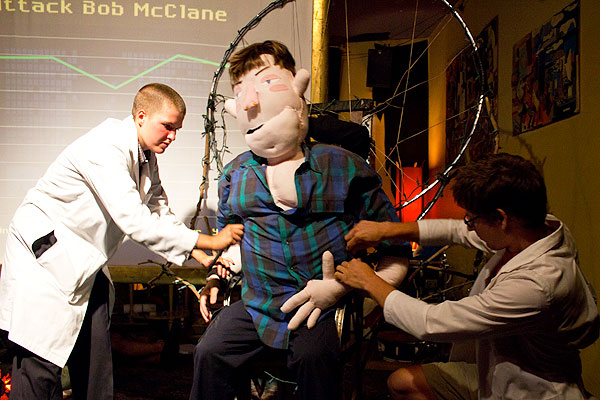I’m sorry, Mario, but your cultural critique is in another castle: some thoughts on hipster irony
Last August I attended a live reenactment of Total Recall (the classic 1990 version, natch, not the remake). It was a deliberately shambolic affair, a loosely-focused variety show run by Everything Is Terrible and Odds N’ Ends, involving puppets, videos, intentionally bad acting, and dancing. It was, I suppose, what some would call “hip” or “ironic.”
At one point we watched a reedited version of one Total Recall‘s many chase scenes—the infamous escalator shootout where Arnold uses a bystander as a shield—now set to Drowning Pool’s “Bodies.” (You can watch the video here.) Which is about as cliched as it gets, but it totally works as comedy.
Part of what makes the video funny is that the Everything Is Terrible folks have upped the intensity of the Drowning Pool song: “Let the bodies hit the floor, let the bodies hit the floor … Oh, wait, they’re totally stepping on that dead guy’s squishy body—ick.” Here we must pause responsibly to acknowledge that Drowning Pool frontman David Williams has always stated that the song is not actually about “the violence thing,” but rather the “respect and code” of the mosh pit, or some such other bullshit. That hasn’t stopped Hollywood folk from using the song in numerous action movie trailers. Nor has it deterred legions of Drowning Pool fans from making their own YouTube versions.
In other words, the Everything Is Terrible video’s ironic effect depends on the pairing being a cliché. Like a lot of satirical and ironic art, it proceeds by imitating an otherwise naïve or sincere effect, then subverting it. (This is why “irony vs. sincerity” is often an unhelpful binary when thinking about phenomena like hipster irony or the New Sincerity; those scenes or movements aren’t strict artistic opposites, since they necessarily share a lot of their aesthetic maneuvers. Where they differ usually lies more in their degree of self-effacement, and in their authorial intention.)
Hipster irony is commonly perceived purely as dismissal: “You’re just making fun of Drowning Pool.” And there’s certainly truth in that—fuck Drowning Pool! But is that all there is? Because the EIT video, I think, and the entire Totally Recalled show, could be perceived as something more. Those behind the show, and those in attendance, I’d argue, were actually trying to appreciate “Bodies”—but in the only way they now can. Irony, in other words, allows hipster audiences to make use of material that would otherwise be off-limits to them.
It won’t surprise you that I want to turn here to Viktor Shklovsky, because he identified a concept that I think might help us. It is his concept of deterioration:
Viktor Shklovsky wants to make you a better writer, part 1: device & defamiliarization
When I was finishing up my Master’s degree at ISU, I worried that I still didn’t know much about writing—like, how to actually do it. My mentor Curtis White told me, “Just read Viktor Shklovsky; it’s all in there.” So I moved to Thailand and spent the next two years poring over Theory of Prose. When I returned to the US in the summer of 2005, I sat down and started really writing.
I’ve already put up one post about what, specifically I learned from Theory of Prose, but it occurs to me now that I can be even more specific. So this will be the first in a series of posts in which I try to boil ToP down into a kind of “notes on craft,” as well as reiterate some of the more theoretical arguments that I’ve been making both here and at Big Other over the past 2+ years. Of course if this interests you, then I most fervently recommend that you actually read the Shklovsky—and not just ToP but his other critical texts as well as his fiction, which is marvelous. (Indeed, Curt has since told me that he didn’t mean for me to focus so much on ToP! But I still find it extraordinarily useful.)
Let’s talk first about where Viktor Shklovsky himself started: the concepts of device and defamiliarization.


